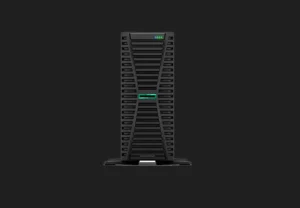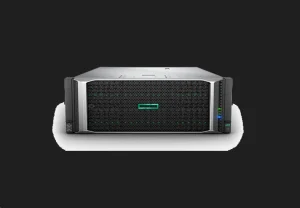Why is Security a Priority for ProLiant Servers in Modern Data Centers?
How Do ProLiant Servers Address Emerging Cybersecurity Challenges?
 In the current data center era, there are more cyber threats than ever before. Servers like HPE Proliant ML350 Gen11 and DL560 Gen10 have also reached a new milestone by implementing cutting-edge security technology to tackle the problem head-on. The HPE Proliant ML350 Gen11 server uses trusted silicon root technology that detects firmware anomalies to stop the spread of malicious code and run the server safely and normally. Ensuring the security of information and upholding smooth operations in ever-changing, IT settings rely heavily upon these characteristics.
In the current data center era, there are more cyber threats than ever before. Servers like HPE Proliant ML350 Gen11 and DL560 Gen10 have also reached a new milestone by implementing cutting-edge security technology to tackle the problem head-on. The HPE Proliant ML350 Gen11 server uses trusted silicon root technology that detects firmware anomalies to stop the spread of malicious code and run the server safely and normally. Ensuring the security of information and upholding smooth operations in ever-changing, IT settings rely heavily upon these characteristics.
What Role Does Firmware Protection Play in ProLiant Servers?
 Protective measures for firmware are components of the security setup in ProLiant servers, such as the DL580 Gen10 model by HPE that integrates iLO technology within its system architecture. Before initiating the operating system, the startup process on these servers’ hardware layers undergoes scrutiny to validate millions of lines of firmware code to ensure that only certified and reliable code is executed. Moreover, such servers conduct checks on a 24-hour basis to validate system firmware integrity when they are running. This practical approach of taking action helps to deal with and eradicate vulnerabilities in time, thereby minimizing susceptibilities that can be successfully attacked by cyberattacks.
Protective measures for firmware are components of the security setup in ProLiant servers, such as the DL580 Gen10 model by HPE that integrates iLO technology within its system architecture. Before initiating the operating system, the startup process on these servers’ hardware layers undergoes scrutiny to validate millions of lines of firmware code to ensure that only certified and reliable code is executed. Moreover, such servers conduct checks on a 24-hour basis to validate system firmware integrity when they are running. This practical approach of taking action helps to deal with and eradicate vulnerabilities in time, thereby minimizing susceptibilities that can be successfully attacked by cyberattacks.
How Does Data Encryption Enhance the Security of ProLiant Servers?
Encryptions are highly significant in ensuring the security of confidential information on the HPE Proliant DL380 Gen11 model, through memory encryption and secure virtualization, with root of trust silicon design capabilities. Even if physical access to the server is breached, these security elements remain resilient by encrypting data at rest and in motion too. Such tough approach by Proliant servers augments heavily against unauthorized access.
What Makes HP ProLiant Server Stand Out in Data Center Security?
How Do These Servers Ensure Secure Boot Processes?
Securing the boot procedures is crucial to block software from running at the beginning of the system startup process. Proliant servers use secure boot techniques backed by Intel Xeon Scalable Processors to guarantee that only verified firmware and software elements are activated during startup, lowering the chance of malware intrusion.
What Features Protect Against Unauthorized Access?
ProLiant servers have security measures in place to prevent unauthorized access attempts effectively, such as the Trusted Platform Module (TPM) found offers extra security features to deter unauthorized server entry attempts. Additionally, intrusion detection systems are set up to record and raise alarms if there is any physical meddling with the server, safeguarding the hardware components’ safety.
Why Are ProLiant Servers a Reliable Choice for Modern Business Needs?
What Benefits Do Businesses Gain from Implementing These Secure Solutions?
Utilizing servers brings numerous benefits to companies. The primary advantage is their ability to adapt and adjust to changing business needs.
Another important advantage is the improvement in operational effectiveness it brings about. The HPE iLO technology present in devices makes managing tasks simpler by automating them and providing real-time monitoring. This leads to a decrease in the time required for maintenance and issue resolution all while keeping systems secure and functioning properly.
Moreover, these servers offer encryption features for data security purposes. The HPE Proliant DL380 Gen11 is an example as it supports memory encryption and secure virtualization with its trusted silicon root architecture. This functionality guarantees the safeguard of data in situations, like physical breaches or unauthorized access attempts.
How Does Huaying Hengtong Support ProLiant Server Integration into Secure Data Centers?
What Services Does Huaying Hengtong Provide for ProLiant Server Deployment?
Huaying Hengtong provides a range of services to support the setup of Pro Liant servers in protected data centers effectively and securely from start to finish. With their knowledge and skills, they guarantee a smooth integration process customized to fulfill business requirements. They conduct evaluations of IT system needs and suggest appropriate Pro Liant server types.
Through utilizing these cutting edge server functionalities, Huaying Hengtong guarantees that companies can attain top-notch performance while upholding security measures. Their deployment offerings encompass, setting up hardware components and tailoring system settings. Integrating networks to guarantee smooth operations of the servers within the current IT setup.
How Does Huaying Hengtong Ensure Seamless Maintenance and Support?
Huaying Hengtong offers maintenance and assistance services to guarantee the smooth functioning of Proliant servers in safe data centers. Their proactive strategy involves system health assessments firmware upgrades and live monitoring to detect possible problems, before they become major concerns.
Their maintenance services also cover conducting hardware diagnostics and providing assistance with replacing components as needed. They have access to spare parts for models, like the ML110 Gen11 and DL580 Gen10 to guarantee the timely resolution of any hardware issues.
In addition to regular maintenance, Huying Hengtong also provides tailor-made training courses for IT teams to equip them with the necessary skills to efficiently manage ProLiant servers, thus prioritizing customer satisfaction. By the integration of know-how and quality service excellence, Huaying Hengtong makes sure that companies can trust their IT infrastructures to enable critical operations securely and efficiently.
Frequently Asked Questions about ProLiant Server
Q: What is a ProLiant server?
A: ProLiant is a family of server computers originally designed and marketed by Compaq, and subsequently marketed by Hewlett-Packard (HP), and currently marketed by Hewlett Packard Enterprise (HPE). ProLiant servers were first released by Compaq in 1993, as a replacement for its SystemPro series of high-end servers..
Q: How does ProLiant Server optimize performance for enterprise applications?
A: ProLiant Servers offer greater flexibility and scalability and thus are ideal for enterprise deployments. They support high-end processors such as Intel Xeon and AMD EPYC and high memory bandwidth to handle intricate workloads and aid businesses in handling challenging workloads more effectively. They offer a modular architecture, which allows businesses to easily upgrade and scale up their infrastructure as and when they grow. With advanced management platforms such as HPE iLO (Integrated Lights-Out), ProLiant Servers also facilitate easier remote management, improving overall operational effectiveness.
Q: What are the energy efficiency benefits of ProLiant Servers for data centers?
A: ProLiant Servers are power-efficient and are equipped with technologies like HPE’s Dynamic Power Capping and Low Power Idle Mode. These technologies ensure a minimum power consumption guarantee with maximum performance. The servers are also equipped with efficient cooling technology, which reduces energy expenses by improving data center airflow. This allows data centers to reduce operating expenses and carbon footprint, making ProLiant Servers an eco-friendly choice for companies with power-efficient IT infrastructure.











